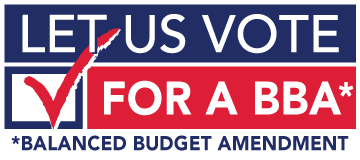This is a supplement to last weeks August 14, 2020 article, Path to a Balanced Budget of presented by Let Us Vote for a BBA Newsletter of August 5, 2020. It was titled The Most Direct Path to a Balanced Budget Amendment. This is from their August 20, 2020 newsletter.
In a recent AP article, writer Michael Biesecker covered a potential federal lawsuit which could force Congress to call an Article V Convention to propose a balanced budget amendment to the U.S. Constitution. In his balanced coverage, Biesecker interviewed opponents of an Article V BBA who raised concerns that deserve to be addressed.
Here is the full Q & A:

AP Article: “Budget Hawks Hatch Plan to Force Constitutional Convention”
Q & A
1. Does the U.S. Constitution provide for a “constitutional convention” as suggested by the title of the Article?
Ans: NO; Article V of the U.S. Constitution does not provide for a “constitutional convention.” Rather, it authorizes a “Convention for proposing Amendments.” The 1787 conclave was the only meeting that can be accurately described as a “Constitutional Convention.”
2. Is the following statement accurate? “The 1787 convention was called to amend the Articles of Confederation but resulted in a whole new national constitution.”
Ans: NO; as an examination of the state delegate instructions to the 1787 Constitutional Convention shows, 11 of the 12 state delegations voted in accordance with their state’s instructions: “to render the Federal Constitution (meaning, at that time, “Federal government”) adequate to the exigencies of the Union.” Only the Massachusetts delegation voted contrary to their state’s instructions that: “the convention be limited only to amending the Articles.”
3. Are the “critics” of an Article V Convention for proposing Amendment(s) correct when they suggest that “a convention could decide to take on topics beyond a balanced budget and propose other big constitutional changes”?
Ans: YES; but only if State Convention Delegates are willing to:
1. Violate their oath of office,
2. Disobey state legislature’s recall orders and
3. Successfully challenge in federal court the state laws prohibiting Article V Convention Delegates from proposing amendments unrelated to the subject of the state’s application and instructions. (Note: The Supreme Court recently upheld state recall and vote-nullification laws in a unanimous decision, prohibiting “faithless” Presidential Electors from violating their oath of office.)
4. Would a Supreme Court decision to “call” an Article V Convention for Proposing Amendments: “overturn decades of legal precedents on the separation of powers for the federal judiciary”?
Ans: NO; quite the contrary. It is The Supreme Court’s responsibility protect the U.S. Constitution’s ultimate “separation of powers” in Article V which mandates that: “Congress shall call the Convention for proposing Amendments…upon the Application of two-thirds (34) of the states.” (Note: In contrast to the law counting State Amendment Ratification Resolutions as old as 202 years, Congress has unconstitutionally avoided counting any of the 700+ Article V Applications passed by the states since 1789.)
5. Would “a federal balanced budget amendment necessitate,” as critics contend, “draconian spending cuts, steep tax increases, or both – potentially causing a prolonged national recession”? (Yes & No response below)
Ans: YES; if Congress were constitutionally mandated to spend no more than annual projected revenues, as has been debated (but never proposed) by Congress.
Ans: NO; if the Balanced Budget Amendment Convention were to propose a spending-growth-limit similar to the Swiss Debt Break, which was approved by 85% of Swiss voters in 2001. With the Debt Brake in place for almost two decades, Switzerland’s record shows no spending cuts, tax increases or man-made national recession. Quite the contrary, Switzerland boasts the world’s fourth highest GDP/capita and has been ranked the most credit worthy country in the world, able to pay down their national debt most years since 2003.
6. Is the following statement correct? “Once you have the convention, it is subject to nobody’s control.?
Ans: NO; State Article V Convention Commissioners will be controlled by their oath, legislative instructions and state laws.
7. Is the statement that the Article V Convention “makes its own agenda” correct?
Ans: NO; the Article V Convention’s “agenda” is determined by a majority of state delegations who are limited by their oath, the state’s Article V Application and state legislature’s instructions on the federal problem(s) which need a proposed constitutional solution.
8. Are the following statements regarding an Article V Convention accurate? “…the field will be thrown wide open for constitutional rewrites…it’s not going to be an exercise in popular democracy”?
Ans: NO; a “Convention for proposing Amendments” cannot ratify an amendment. However, “an exercise in popular democracy” can! The 21st Amendment, repealing Prohibition, was ratified by a majority vote of the people in three-quarters of the states via “Yes-Pledged” Delegates to State Ratification Conventions.
PO Box 193 | New Smyrna Beach, FL 32170 | 386-423-4744
LetUsVoteforBBA.org | info@LetUsVoteforBBA.org

